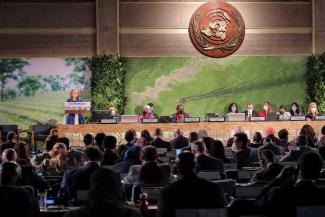Multilateralism
"The UN must adapt to global change"

The UN Environment Programme (UNEP) is celebrating its 50th anniversary this year. It is based in Nairobi. Does that make a difference in the eyes of East Africans?
Well, to some extent, having UNEP in the neighbourhood does lead to a sense of belonging and closeness. It also offers an opportunity for exchange, making it easier to contribute to the environmental agenda. If you consider the global role of UNEP, however, it is really only of minor relevance where the agency is based.
There are tangible projects, however. Last year, UNEP joined forces with private-sector companies to publish air-pollution data on digitised billboards in Nairobi. The idea was to make people aware of the issue.
Yes, I have heard about this initiative and about similar ones too. They obviously make sense, but they should not belong to the core mission of UNEP. The agency should focus on more important and strategic things.
What do you have in mind?
The big issue is to redirect the global agenda towards integrated environmental protection and climate action. UNEP should ensure more is done around the world, but it shouldn’t be involved in individual projects. Its real job should be to organise and coordinate at a higher level. The world is changing, and environmental problems have been getting worse. Business as usual is not an option anymore, but the UN system has remained the same. The UN must adapt to global change.
In what ways do you want the UN to change?
Effective environmental management should take bottom-up approaches. To solve problems, we must first consider what is needed at local and national levels – and that is what I said in our previous conversation (see interview on www.dandc.eu). At the UN level, the task is to create appropriate preconditions for such action. Least developed countries have not caused the climate problems, for example, but they are suffering the impacts. They need fast and efficient access to funding. There are currently too many institutions and too many layers of hierarchy. We do not need many specialised environment programmes. What we need is fewer, but better coordinated institutions. The goal should be to have one strong agency, rather than a broad range of agencies. At this point, UNEP is in charge of the environment, the Secretariat of the UNFCCC (UN Framework Convention on Climate Change) is dealing with climate issues, and the UNDP (UN Development Programme) is promoting the sustainable development agenda, and they are only three of many relevant UN agencies. Of course, the World Bank, the African Development Bank and other multilateral institutions matter too.
Are some institutions superfluous in your eyes?
Well, my Ugandan experience shows that, when you’re working at the grassroots level, it can be very hard to tell the difference between UNEP and the UNDP. Both institutions, moreover, should focus on international coordination. The 17 Sustainable Development Goals (SDGs) actually provide a good opportunity. If all UN agencies systematically used them as guidelines, their action would probably be coordinated better. After all, the SDGs spell out a coherent agenda, and none of them should be considered in isolation. The job of institutions like UNEP or the UNDP is to coordinate national governments for this purpose, but without duplication of efforts. The UN must become better at coordinating itself in order to become better at coordinating the global agenda.
Where exactly do you see deficits?
Just consider financing, for example. According to the London-based International Institute for Environment and Development, only about 10 % of global climate finance meant for adaptation reached the local level for action in the years 2003 to 2016. A mere 10 %! Too much of the rest is spent on engaging intermediary organisations, consultancies and institutional overheads. A lot of money is being wasted because of very many unnecessary layers. Environmental finance should flow to where it is needed most to bring about the greatest impact.
Various development banks and funds are making money available for development projects.
Yes, exactly. We have the Adaptation Fund, the Green Climate Fund and various other institutions. Each one has its own application procedure. Each one has its own mechanisms for disbursing money and its own system of monitoring and reporting. In terms of both time and resources, all parties concerned are paying a very high price. If you want to get funding from one of them, you’ll need specialised professional advice. It took the government of Uganda five years to get accreditation at the Green Climate Fund, for instance, and another two years went by, before it could access funding. Such a complex procedure would be acceptable if things were coordinated and coherent at later stages. They aren’t. Everything keeps changing with different actors. Even if you have some experience with one institution, you have to start anew with the next one. That is not only Uganda’s experience, but other countries’ experience as well.
What does that mean for local-level projects?
Typically, several donors are involved in funding different projects, so funding for an individual project often runs out of breath fast. For example, a climate-adaptation project in village A will get money for a year, which is normally too short. When funding stops, the village is left to itself – with harmful impacts on the entire ecosystem. Far too many lessons are never learned. A few kilometres away, another donor may be funding similar efforts in village B. That project does not take into account what worked out well in village A – and what failed. The same mistakes are thus made again and again. Successful projects are rarely scaled up. Instead, we see pilot project after pilot project, which is quite inefficient. Inadequate coordination at the higher level thus has impacts at the lower levels.
Governments that get international funding are not speaking in one voice either. Should African governments do more to coordinate their stance?
Yes, absolutely. Generally speaking, I think that developing countries should do more in terms of questioning the status quo. Some African governments, however, tend to prevent better coordination. Instead, they intentionally foster a certain ambiguity because it serves powerful interests. It makes corruption easier to have a broad variety of funding agencies that all operate in their own special ways. African countries not only need better coordination, but governance as well.
The African office of UNEP hosts a forum that is meant to coordinate African governments in regard to environmental issues. Is the African Ministerial Conference on the Environment (AMCEN) up to task?
There are various settings that are supposed to make Africa speak with one voice in environmental affairs, including at the level of ministers like the AMCEN. The Nile Basin Initiative is another supranational forum for discussing matters such as water-resources management or energy infrastructure. These bodies give governments scope for taking joint decisions and even settling disputes. The big challenges, of course, are always implementation and consistency.
Aid effectiveness has been a hot topic for decades. It does not look like the international community is heeding the lessons of the Paris Declaration on Aid Effectiveness. In 2005, it emphasised issues such as national ownership, donor harmonisation and mutual accountability.
I do not expect the system to change top-down. If at all, change will have to happen bottom-up. The good news is there is some momentum. When representatives of grassroots initiatives and local governments are invited to meetings by UNEP or other global agencies, they increasingly ask: “Is this about meetings and policies – or is this about action on ground?” They are tired of rhetoric and fancy sounding agreements. They want to know what exactly will happen in their community – and how that will relate to local needs. I think the hope is in the emerging locally-led revolutions. We need to see aid that fits people’s needs, not the other way round.
David Mfitumukiza is senior lecturer in the Department of Geography, Geo-Informatics and Climatic Sciences (GGCS) at Uganda’s Makerere University in Kampala.
dmfitumukiza@gmail.com













